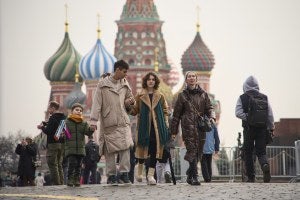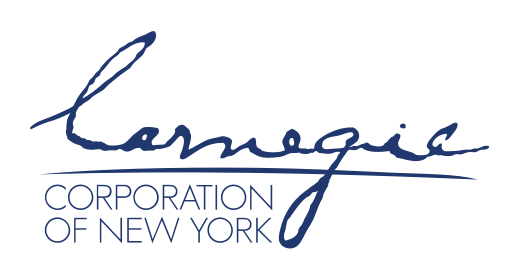While the public thinks Putin’s foreign policies have improved Moscow’s international influence and the state of the Russian military, fewer now say they have boosted their country’s image abroad.
After holding several rounds of separate negotiations with Russian and Ukrainian officials, the White House announced this week that both sides have agreed to halt all military action in the Black Sea and develop measures to stop striking each other’s energy facilities. Russian President Vladimir Putin added a caveat to the cessation of hostilities that requires lifting trade restrictions imposed on Russian agricultural exports in 2022.
While the Russian public response to the agreement is yet to be seen, previous polling by the Levada Center has shown high public approval of both Putin’s performance as president and the direction of the country under his leadership. However, according to a February 20–26, 2025, Chicago Council on Global Affairs-Levada Center survey, everyday Russians perceive mixed impacts of the Kremlin’s foreign policy.
Key Findings
- Russians believe their government’s foreign policy decisions have improved the state of the defense forces (76%) and the country’s international influence (64%). But they are more divided on their effects on the economy (49% improved, 36% worsened).
- Pluralities think Russia’s foreign policy has worsened its international image (45%), standards of living (44%), and relationship with the United States (44%).
- Russian President Vladimir Putin is seen as having the most influence in Russia’s foreign policy (90%), followed by the Ministry of Defense (78%) and the Ministry of Foreign Affairs (74%).
- Two-thirds of Russians (65%) support the use of private military contractors to conduct combat operations on behalf of Russia’s interests abroad.
- A smaller majority (56%) support using North Korean forces to conduct combat operations in Ukraine.
Public Sees Improved International Influence from Putin’s Foreign Policy
In the last two decades, the Kremlin’s foreign policy has greatly focused on reestablishing Russia’s status as a global power and Russian influence in post-Soviet Eurasia, culminating in the ongoing special military operation in Ukraine. Despite being heavily sanctioned and isolated from the international community, Russians are quite proud of their country’s achievements in the world (per the January 2025 Chicago Council-Levada Center survey). Large percentages say they are proud to be a citizen of Russia (96%), of Moscow’s political influence in the world (74%), of Russia’s military achievements (82%), and—to a lesser extent—of Russia’s economic achievements (57%).
A more recent February 20–26, 2025, Levada Center survey asked Russians about the impacts of their country’s broader foreign policy in recent years. The findings point to a sense that the Kremlin’s international actions have had a positive impact on the political and military fronts, but less so in the economic realm.
As in 2019 (when last asked), majorities say Russia’s international policy has improved its international influence (64%, 62% in 2019) and the state of its military forces (76%, 83% in 2019). Fielded after US President Donald Trump’s initial outreach to Putin, there has been a notable increase in those who say Russian foreign policy has improved the US-Russia relationship (32%, up from 11% in 2019), though a plurality continues to say Kremlin policy has worsened bilateral relations (44%, dramatically down from 78%). In fact, 85 percent of Russians have a positive view of the meeting between US and Russian officials in Saudi Arabia last month and 51 percent of Russians have a favorable opinion of Trump (compared to 79% who have an unfavorable view of Biden). Moreover, six in 10 Russians (58%) support the expansion of economic, political, and cultural ties with Western countries.
Russians See Deterioration in Country’s Global Image, Slight Improvement in Living Standards, Due to Kremlin’s Policies
Russians have also shifted their views on how the Kremlin’s foreign policy has affected their country’s reputation abroad. Only three in 10 (29%) now believe Russian foreign policy has improved the country’s image abroad, down from 44 percent in 2019. A plurality say Russia’s foreign policy has worsened its international image (45%, similar to 42% in 2019). Additionally, more now say they are uncertain (25%; an increase from 14% in 2019).
The public is less pessimistic about the economic impacts of Russia’s foreign policy than they were in 2019. A plurality now say the Kremlin’s foreign polices have improved the economic situation (49% vs. 36% worsened). This is a reversal from views six years ago, when a majority said it had worsened (58% vs. 31% improved). While a plurality still believe Russian policy has negatively impacted standards of living in the country (44% worsened), this is substantially lower than the 64 percent who felt this way in 2019.
While one might expect that a perceived deterioration in living standards could turn some Russians against the continuing military conflict in Ukraine, last month’s results revealed that everyday Russians believe they need to trade off improved living standards for the Kremlin’s international posture now. For the first time since 2003, a majority of Russians say they would like to see Russia as a great power that is feared and respected by other countries (55%) rather than a country with a high standard of living (41%). Levada’s focus group discussions around these topics reveal that some participants believe Russia is currently being pressured collectively by the West and the United States and that Russia has to project power abroad to counter this pressure.
Putin Clearly Seen as the Chief Foreign Policy “Decider”
Russia’s constitution grants the president express authority over the foreign policy of the Russian Federation, and the public is clear-eyed on who is calling the shots when it comes to Russia’s international policy. When asked about the relative influence of people and groups on Russian foreign policy decisions, by far, Putin is seen as having the greatest influence (90%, including 72% saying he has a great deal of influence). At the same time, majorities also believe that the Ministry of Defense (78%) and the Ministry of Foreign Affairs (74%) have at least a fair amount of influence. Business elites (63%) are seen as having a greater voice on foreign policy than the Duma (54%) or regional governors (47%). Least of all, public opinion is considered by just 37 percent as having a great deal or fair amount of influence on foreign policy.
Broad Support for Using Military to Protect Russians at Home and Near Abroad
Many analysts worry that Moscow will feel emboldened if a peace agreement with Kyiv allows Russia to hold the territory it has gained in Ukraine—and that it could lead to additional incursions in other former Soviet countries. For their part, the Russian public is closely divided on whether their country’s national interests should be limited to its current territory (45%) or extend beyond (41%).
But in a separate question, there is majority support for using military force against some other countries if Russians living there are at risk. Asked about scenarios when it would be acceptable to use military force, Russians overwhelmingly agree that defending the territorial integrity of their country is an appropriate use of their military forces (95%). Most also believe it is acceptable to use the Russian military to defend their country’s economic interests (78%) and to defend the interests of Russians living in former Soviet countries (70%). In a separate question, eight in 10 Russians continue to support the special military operation in Ukraine (80% in the February Levada survey).
Beyond the former Soviet republics, everyday Russians are more divided on whether it is appropriate to use military force to defend Russians living in other countries (49% acceptable vs. 38% unacceptable).
Little Opposition to Private Military Contractors or North Korean Troops Fighting on Russia’s Behalf
The Russian government has broadened its use of private military companies (PMCs) since approximately 2015 after it moved to retake Crimea. They are used to spread the Kremlin’s global influence, broaden its military and intelligence-gathering footprint, and secure access to resources and other economic gains in places as far-flung as Libya, Sudan, Mali, Ukraine, and Venezuela.
The Russian PMC most familiar to observers abroad was the Wagner Group, led by Yevgeny Prigozhin, who briefly challenged the Russian military leadership over its handling of the conflict in Ukraine. Since Prigozhin’s death in August 2023, the Wagner forces operating in Ukraine have been incorporated into official Russian security structures.
Despite the turmoil caused by Prigozhin’s Wagner Group, Russians seem unfazed by the government’s use of these PMCs or other troops fighting on their country’s behalf. Two-thirds support the use of PMCs to conduct combat operations on behalf of Russia’s interests abroad (65% vs. 19% oppose). This may be because PMCs are seen as sparing ordinary Russians from fighting in conflicts themselves.
In addition to PMCs, North Korea has deployed an estimated 10,000 to 12,000 soldiers to aid Moscow in fighting Ukrainian forces in southern Russia (according to South Korean and Ukrainian sources).1 Just in the past month, Russian and North Korean troops have regained control of several villages in the Kursk region of Russia; Ukraine had been holding this territory to use as a bargaining chip for peace negotiations. As far as the Russian public goes, a majority support using North Korean forces to conduct combat operations in Ukraine (56% vs. 25% oppose).
Conclusion
Putin remains the dominant force shaping Russian foreign policy, and the public largely backs the use of military force to protect their country’s perceived interests, both within and beyond its borders. As Russia navigates the conflict with Ukraine and broader geopolitical challenges, there is growing recognition that its foreign policy actions have come at the cost of its international reputation. However, the Trump administration’s concessions in recent peace negotiations and reestablishment of ties with the Kremlin may indicate to some Russians that, at the end of the day, the Kremlin’s strategy is paying off.
1. They had been forced to withdraw from the battle and regroup last January but have since returned.
This Chicago Council-Levada Center survey was conducted February 20–26, 2025, among a representative sample of all Russian urban and rural residents. The sample consisted of 1,615 Russians 18 or older from the 137 municipalities within the 50 regions of the Russian Federation. Researchers from the Levada Center conducted personal interviews in respondents’ homes.
The distribution of responses is given as a percentage of the total number. The data set is weighed by gender, age, level of education for each type of settlement (large cities, medium cities, small towns, villages) within each federal district independently, in accordance with Rosstat data. The statistical error of these studies for a sample of 1,600 people (with a probability of 0.95) does not exceed 3.4 percent for indicators around 50 percent, 2.9 percent for indicators around 25 percent/75 percent, 2.0 percent for indicators around 10 percent/90 percent, and 1.5 percent for indicators around 5 percent/95 percent.






Related Content
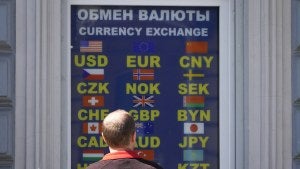 Public Opinion
Public Opinion
Most believe Russia should continue to pursue an independent foreign policy despite the sanctions, which are attributed to the West’s hostility and misunderstanding of the situation in Ukraine.
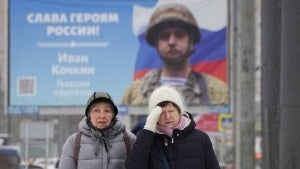 Public Opinion
Public Opinion
But the public is more ready than ever to enter peace negotiations.
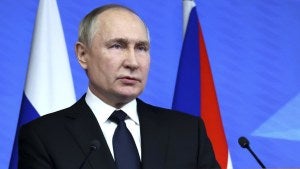 Public Opinion
Public Opinion
The public shares the Kremlin's dim view of Western powers and wants to boost cooperation with BRICS members.
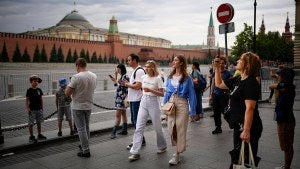 Public Opinion
Public Opinion
Russian young adults have a more positive economic and political outlook than their American counterparts, yet both youth populations think equally about emigrating.
